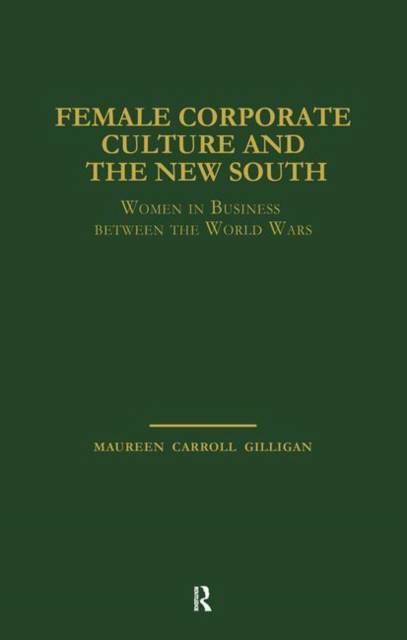
- Afhalen na 1 uur in een winkel met voorraad
- Gratis thuislevering in België vanaf € 30
- Ruim aanbod met 7 miljoen producten
- Afhalen na 1 uur in een winkel met voorraad
- Gratis thuislevering in België vanaf € 30
- Ruim aanbod met 7 miljoen producten
Zoeken
Female Corporate Culture and the New South
Women in Business Between the World Wars
Maureen Carroll Gilligan
€ 190,95
+ 381 punten
Uitvoering
Omschrijving
Before World War I, Southern women's participation in the workforce consisted of black women's domestic labor and white working-class women's industrial or manufacturing work, but after the war, Southern women flooded business offices as stenographers, typists, clerks, and bookkeepers. This book examines their experiences in the clerical workforce, using both traditional labor sources and exploring the cultural institutions that evolved from these women's work-related milieu.
Businessmen throughout the South molded this workforce to meet their needs using both labor-saving management techniques and exploiting social mores to enforce gender boundaries that limited women's workplace opportunities. This study traces the social and economic implications of Southern women's increased participation in clerical labor after World War I. While it increased the civic activities of white middle-class southern women, it also confined them to a routinized days work and limited venues of occupational achievement. Through a varied network of business women's clubs and organizations, women struggled with their new identities as workers and attempted to integrate their work lives with their community and family obligations.
(Ph.D. dissertation, Emory University, 1995; revised with new Introduction and Preface)
Businessmen throughout the South molded this workforce to meet their needs using both labor-saving management techniques and exploiting social mores to enforce gender boundaries that limited women's workplace opportunities. This study traces the social and economic implications of Southern women's increased participation in clerical labor after World War I. While it increased the civic activities of white middle-class southern women, it also confined them to a routinized days work and limited venues of occupational achievement. Through a varied network of business women's clubs and organizations, women struggled with their new identities as workers and attempted to integrate their work lives with their community and family obligations.
(Ph.D. dissertation, Emory University, 1995; revised with new Introduction and Preface)
Specificaties
Betrokkenen
- Auteur(s):
- Uitgeverij:
Inhoud
- Aantal bladzijden:
- 192
- Taal:
- Engels
- Reeks:
Eigenschappen
- Productcode (EAN):
- 9780815331841
- Verschijningsdatum:
- 1/04/1999
- Uitvoering:
- Hardcover
- Formaat:
- Genaaid
- Afmetingen:
- 147 mm x 225 mm
- Gewicht:
- 381 g

Alleen bij Standaard Boekhandel
+ 381 punten op je klantenkaart van Standaard Boekhandel
Beoordelingen
We publiceren alleen reviews die voldoen aan de voorwaarden voor reviews. Bekijk onze voorwaarden voor reviews.











